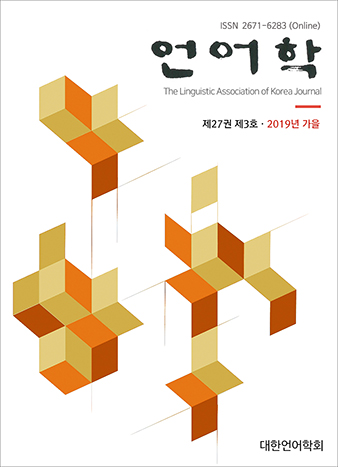대한언어학회 전자저널

27권 3호 (2019년 9월)
- Readers’ Language Experience in Generating Korean Wh-Constructions
-
On-Soon Lee
Pages : 149-171
Abstract
Lee, On-Soon. (2019). Readers’ language experience in generating Korean wh-constructions. The Linguistic Association of Korea Journal, 27(3), 149-171. This study investigates the role of language experience, which is shaped by the distributional patterns occurring in input, in structural preferences in language production. In order to accomplish this purpose, a corpus analysis and a sentence completion experiment were conducted. Specifically, thirty-six Korean-speaking adults participated in the experiment, in which they read and completed sentence fragments including either a scrambled or an in-situ wh-phrase. When the participants generated questions, they attached the question-marking particle to a verb as soon as possible after encountering the wh-phrase, suggesting an active dependency formation mechanism. This finding supports the Active Filler Strategy hypothesis, a major account for the processing of filler-gap dependencies, but does not support any effect of the readers’ linguistic experience.
Keywords
# filler-gap dependency # active filler strategy # language experience # which-question # sentence completion
References
- Aoshima, S., Philips, C., & Weinberg, A. (2004). Processing filler-gap dependencies in a head-final language. Journal of Memory and Language, 51, 23-54.
- Atkinson, E., Wagers, M., Lidz, J., Philips, C., & Omaki, A. (2018). Developing incrementality in filler-gap dependency processing. Cognition, 179, 132-149.
- Choi, J. (2005). A corpus-based approach to the Korean wh-question words mwusun and enu: A pedagogical perspective. In R. Bley-vroman, & H. Ko (Eds.) Corpus Linguistics for Korean Language Learning and Teaching (pp. 107-147). Honolulu, HI: University of Hawai’i Second Language Teaching & Curriculum Center.
- Crain, S., & Fodor, J. D. (1985). How can grammars help parsers? In D. R. Dowty, & L. Kartuunen, & Zwicky, M. (Eds.). Natural Language Parsing: Psychological, Computational and Theoretical Perspectives (pp. 92-128). Cambridge: Cambridge University Press.
- Frazier, L. (1987). Syntactic processing: Evidence from Dutch. Natural Language and Linguistics Theory, 5, 519-560.
- Frazier, L., & Clifton, C. (1989). Successive cyclicity in the grammar and the parser. Language and Cognitive Processes, 4, 93-126.
- Hahn, H., & Hong, S. (2014). Processing scrambled Wh-Constructions in head-final languages: Dependency resolution and feature checking. Language and Information, 18(2), 59-79.
- Hale, J. (2001). A probabilistic earley parser as a psycholinguistic model. In Proceedings of the 2nd Meeting of the North American Chapter of the Association for Computational Linguistics on Language Technologies (pp. 159-166). Pittsburgh, PA: Association for Computational Linguistics.
- Hale, J. (2003). The information conveyed by words in sentences. Journal of Psycholinguistic Research, 32(2), 101-123.
- Hale, J. (2006). Uncertainty about the rest of the sentence. Cognitive Science, 30(4), 643-672.
- Jäger, L., Chen, Z., Li, Q., Lin, C., & Vasishth, S. (2015). The subject-relative advantage in Chinese: Evidence for expectation-based processing. Journal of Memory and Language, 80(1), 97-120.
- Levy, R. (2008). Expectation-based syntactic comprehension. Cognition, 106, 1126-1177.
- Omaki, A., & Schulz, B. (2011). Filler-gap dependencies and island constraints in second language sentence processing. Studies in Second Language Acquisition, 33, 563-588.
- Pickering, M. J., & Traxler, M. J. (2003). Evidence against the use of subcategorisation frequency in the processing of unbounded dependencies. Language and Cognitive Processes, 18(4), 469-503.
- Roland, D., Dick, F., & Elman, J. L. (2007). Frequency of English grammatical structures: A corpus analysis. Journal of Memory and Language, 57(3), 348-379.
- Staub, A. (2010). Eye movements and processing difficulty in object relative clauses. Cognition, 116(1), 71-86.
- Sohn, H. (1994). The Korean language. UK: Cambridge University Press.
- Stowe, L. E. (1986). Parsing wh-constructions: Evidence for on-line gap location. Language and Cognitive Processes, 1(3), 227-245.
- Wagers, M., Borja, M. F., & Chung, S. (2015). The real-time comprehension of wh dependencies in a wh-agreement language. Language, 91(1), 109-144.
- Wallis, S. (2014). What might a corpus of parsed spoken data tell us about language? Proceedings of Olinco 2014 (pp.1-14). Czech Republic: Palacký University,
- Yun, H., Nam, Y., Yoo, D., & Hong, U. (2015). The effect of role shifting and expectation in the processing of center-embedded relative clauses in Korean. Linguistic Research, 32(2), 313-353.